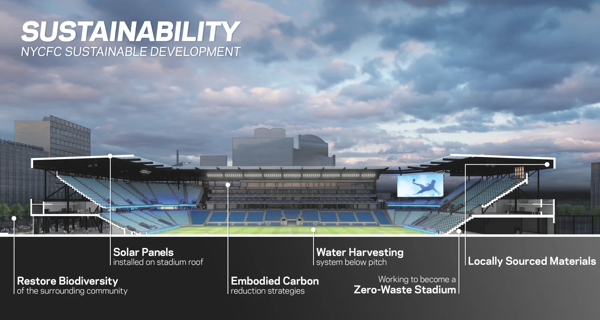- December 20, 2023
- Posted by: SportsV
- Categories: Featured Articles, Features, Home News, Industry News, News, Press Releases

New York City Football Club have revealed extensive sustainability plans at a local community board meeting in Queens for the Club’s proposed new soccer stadium in Willets Point. The 25,000-seat stadium would become the first fully electric stadium in Major League Soccer (MLS), in addition to being the first fully electric professional sports stadium in New York City.
Details of NYCFC’s sustainability plan come as the stadium, which is part of the Willets Point Phase 2 project, formally enters the Uniform Land Use Review Process (ULURP) last month.
In addition to a fully electric stadium which will be privately financed, the Willets Point development project would also deliver a total of 2,500 units of 100% affordable housing at the site, as well as a 650-seat public school, 40,000 square feet of new public open space, retail space and a 250-key hotel.
As part of NYCFC’s sustainability plan, the design and building of the stadium will focus on the following:
Renewable Energy
An emergency backup generator will be provided and only operate during a utility power outage or when code required testing is performed.
Efficient Water Systems
Materials
Public Transportation
Waste Reduction, Reuse and Recycling
Through the stadium project, the Club will work proactively with suppliers to ensure that there is a supply chain approach to its sustainability agenda, often working with small, local suppliers to improve and uplift their own related sustainability agendas, therefore improving the local community further.

Emissions Measurement
Compliance
New York City Football Club’s stadium sustainability plan particularly recognises the key risks facing our planet, including extreme heat, drought conditions, flooding, fire and smoke pollution, and clean air risks.
Mayor Adams said:
I’m proud that New York City will be home to the first fully electric sports stadium in Major League Soccer. It’s imperative that we continue our shift to a more sustainable and resilient future, helping New York to better prepare for a changing climate. As a city, we’re reshaping our relationship with energy: how we generate, store and use it. New York City Football Club’s stadium will serve as a model for that goal. New York City has taken significant steps to become more sustainable, resilient and equitable, and this proposed stadium encompasses those commitments.
NYCFC CEO, Brad Sims, said:
New York City Football Club is proud to release details of what would be a historic first-ever fully electric professional sports stadium for both MLS and New York City. Sustainability is at the heart of this project, and we’re focused on ensuring that the Club is leading the way when it comes to reducing environmental impact. We’re committed to building a stadium that serves as a model for projects in the future. Through renewable energy, the use of efficient materials, waste reduction and effective compliance, we’re excited to deliver a sustainable home for the Club and local community for decades to come.
Council Member Francisco Moya added:
This soccer stadium, and the larger Willets Point project, will transform a part of Queens that has a long and difficult history of environmental degradation. It’s imperative that protecting vulnerable communities against the effects of climate change is at the heart of all infrastructure projects in our borough. As this stadium plan demonstrates, New York City Football Club takes sustainability incredibly seriously. I’m excited and proud that Queens would be home to a stadium that would serve as a model to others moving forward.
Pete Bradshaw, City Football Group’s Director of Sustainability, said:
New York City Football Club is driven by a passionate belief that the sport can have a positive impact in our communities and empower better lives. Sustainability is at the core of that belief and we’re committed to playing our part in the future of our communities. New York City Football Club’s sustainability plan sets out clear priorities on our journey to credible net zero by eliminating risk, building resilience and creating opportunities.
Chris DeVolder, Senior Principal with the stadium’s design and architecture firm HOK, noted:
HOK’s approach to sustainability aligns with NYCFC’s culture, prioritising the well-being of the fans and the community. We integrated many sustainability strategies – solar power, water harvesting, access to public transportation and enhanced biodiversity – into the new stadium design to create a people-friendly environment that brings added value far beyond match day.
Source & imagery, courtesy: NYCFC
Sports Venue Business has been responsible for the organisation & delivery of ALSD International on behalf of the ALSD from its inception. Moving forward, SVB has unveiled a raft of new offerings under the SVB LIVE (Live Industry Venue Experience) banner, including networking events & webinars, all culminating in an annual event.
SVB is also launching an exclusive subscription-only Global Report for 2024 outlining New Builds, Renovations & Major Refurbs, with an Expert Council – featuring an array of industry executives from across the globe – helping to shape the conversation across all SVB LIVE events and the global community.
#SportsVenueBusiness – The leading platform for sector news, views & developments
#SVBLIVE – Networking & bringing the Live Industry together to share insights & innovations


